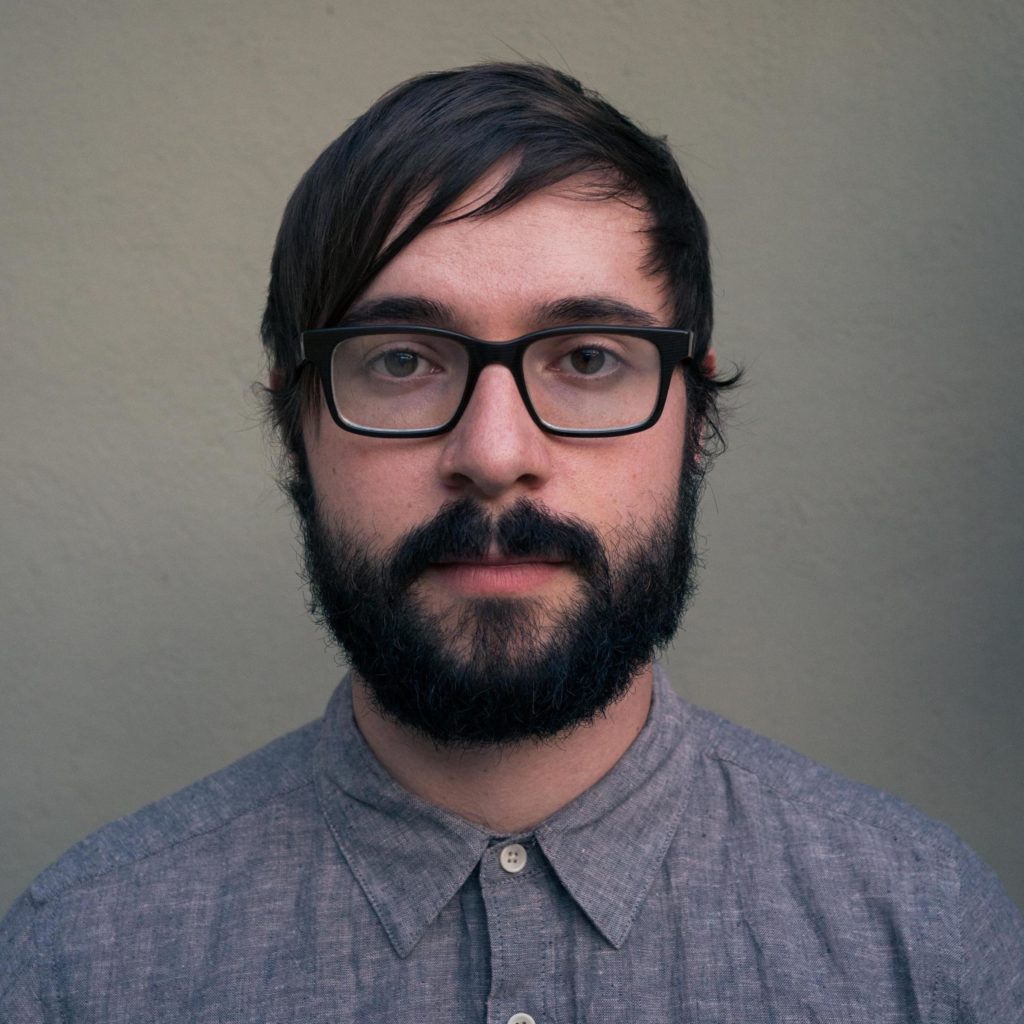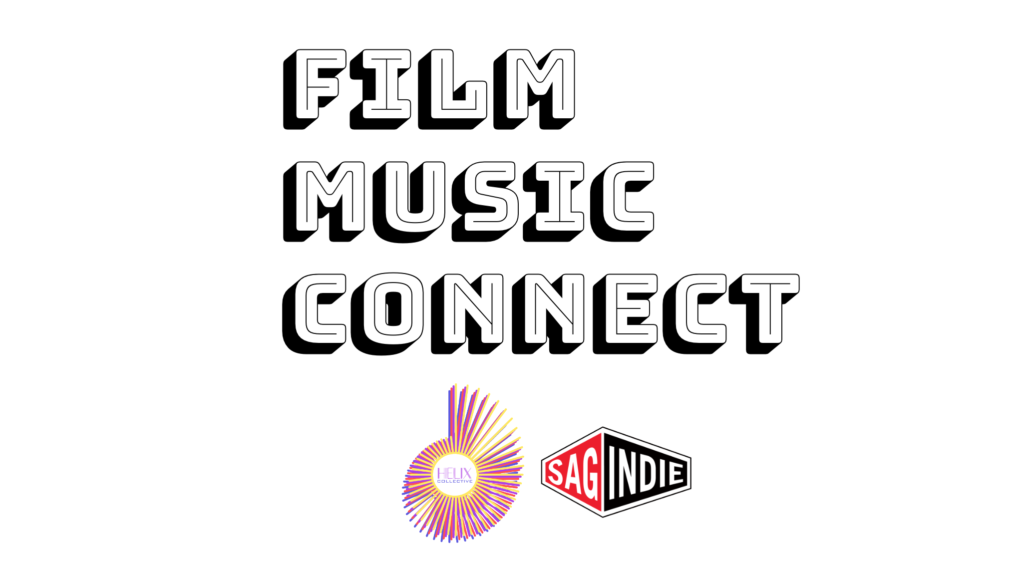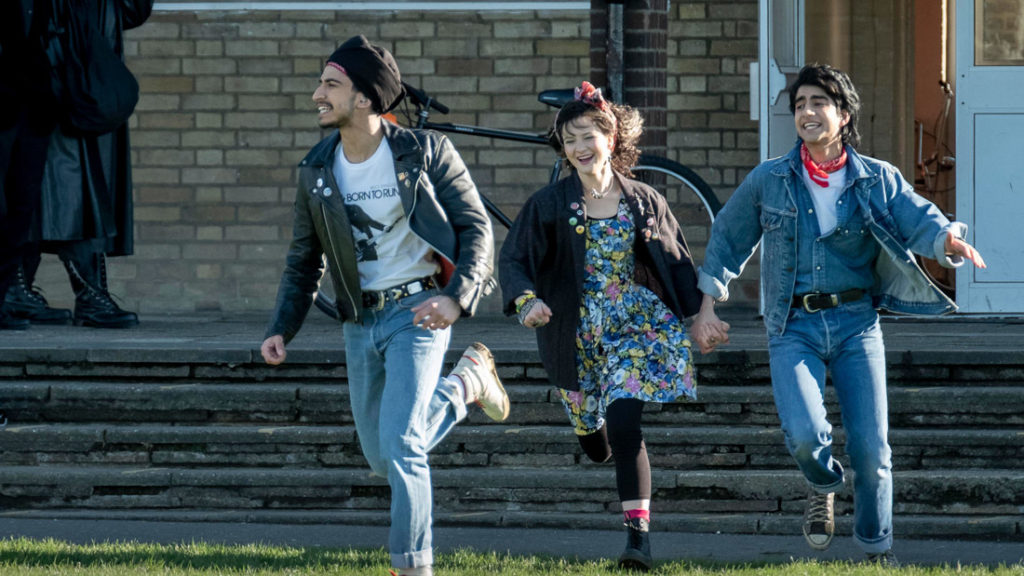In the twisted new thriller FAULTS, down-on-his-luck mind control expert Ansel Roth (Leland Orser) receives a job offer he can’t refuse: Rescue and “deprogram” a woman named Claire (Mary Elizabeth Winstead) from a mysterious cult and return her to her parents. To say this ends up not being such an easy gig for Ansel is about the most un-spoilery way to describe writer/director RILEY STEARNS‘ feature debut.
Upon relocating from Austin to Los Angeles, Stearns started a career in TV writing before directing his first short film in 2011. Two more shorts later (including 2013’s Sundance-selected and VICE-approved The Cub), Riley premiered Faults last year at SXSW. With its dark comedic streak and wicked sense of desperation, the film (and filmmaker) has received more than one comparison to the Coen Brothers. Produced by Snoot Entertainment and released by Screen Media, Faults arrives in theaters and on iTunes and Vimeo OnDemand on March 6.
SAGindie sponsored the Faults screening at last year’s AFI Fest, and now writer/director Riley Stearns has answered some questions for us about the film and his career. Below he talks about the best criticism he’s received, his trouble finding a lead actor for the film, and what it was like premiering in his hometown.
——
COLIN McCORMACK: Faults is your first feature as writer/director. What was your biggest learning curve in that leap from short to feature filmmaking?
RILEY STEARNS: The biggest thing for me was just trusting that I could survive a shoot longer than two days. Once I was there on set, I realized I was going to be fine. Despite it being a grueling schedule, my body and mind adjusted and it sort of just became the norm. I wasn’t sleeping much but I knew that it was temporary. Really though, it was incredibly fun and easily the most gratifying thing I’ve ever done.
CM: Much of the film was shot in a motel. What were some pros and cons of shooting in such a confined space?
RS: Even though most of the film takes place in a motel room, we actually shot all of the interiors of the motel on a soundstage. While that wasn’t my original thinking as I was writing the script, it became clear pretty early on in pre-production that shooting on location would come with a lot of complications… particularly in terms of audio, lighting and cramped shooting conditions. We were able to have total control over all of these aspects, including the cramped space as we built the motel set something like thirty percent larger than a real motel room. Now I’m sort of addicted to shooting on a stage and the next thing I’m working on will probably be the same sort of set up.
CM: You started out pursuing screenwriting and initially rejected the idea of moving to directing. What in the end made you want to transition?
RS: I initially got into film and filmmaking because of my then girlfriend, now wife, Mary [Elizabeth Winstead]. She’d been acting professionally since before she was 12 and we met when we were 17 and 18. At that point I thought I wanted to be a professional musician. After visiting her on various sets I started falling in love with the behind the scenes aspect of films and not just the finished product. I began writing because it seemed like the easiest thing for me to just sort of jump in to. I was on the set of Final Destination 3, which she acted in and I remember telling the director, Jim Wong, that I wanted to be a screenwriter. He told me, “You’re going to be a director too, I can tell.” At that point I was adamant that I didn’t want to be that guy and have all the attention and weight on me. But I never forgot him being so sure that I’d be directing someday. Years sort of went by and I ended up directing a short that I never finished but I loved the experience. I ended up writing for a TV show and watched my scripts get rewritten and directed by someone who made choices I wouldn’t have made and I just sort of had enough of doing stuff that I didn’t have total control over. So it came from a place of selfishness and control I guess!
CM: Did you do a lot of research on cults while writing the script? Was there ever a point you worried you were getting in a little too deep? Like, “Hey, aside from the mass suicide this group doesn’t sound so bad!”
RS: No, no. I definitely still feel pretty much like myself. No brainwashing to speak of! I didn’t necessarily do a lot of research leading up to the film but I have, ever since I was a kid, read stories and watched movies and documentaries on cults. The story and the script itself are in a way a culmination of all of those pieces of information my brain has been soaking up over the years.
CM: Tell us a little about your experience landing on The Black List (an annual list of the most popular unproduced screenplays in Hollywood).
RS: The Black List thing was amazing but also a little unexpected. I’d written the script for Faults in February of 2013. My producers, Keith and Jess Calder, were the first producers to read it and immediately signed on to make it. My manager passed it around to a few people in town to show people what kind of filmmaker I was and I began hearing in meetings that it was being shared on private screenplay message boards for industry people and was actually getting a lot of attention. But I had no idea it even stood a chance at showing up on something like The Black List, partly because we shot the film before the list came out! But there I am, sitting in the editing room one morning and I start getting all these texts and tweets saying that Faults was on the list and my producers called and congratulated me and we laughed because at that point it wasn’t an “unproduced screenplay.” But I couldn’t have been more honored to be on the same list as real writers with real scripts. It’s certainly something I’m massively proud of considering how different and small my script feels compared to a lot of the other scripts it was alongside.
CM: You’re pretty active on Twitter and Instagram. When a film doesn’t have a huge marketing budget, have you found social media to be effective in building interest for the film?
RS: Effective? I’m not sure I’ll ever really know the answer to that but I’m definitely trying my best to drum up excitement and also use it as an outlet for just how excited I am personally. I just hope I’m not annoying too many people with all of my Faults tweets.
CM: You’ve done a lot of film festivals at this point. How have reactions differed from audience to audience? How does a FrightFest crowd give a different energy than an AFI or SXSW crowd?
RS: The film has played festivals around the world and luckily I’ve had the opportunity to attend a handful of them. Each and every crowd and city and country is different in how they react to the film so far. Some get the humor more while some seem to get more creeped out by the film. So far, for the most part, everyone’s seemed to enjoy the film, if at varying audible levels. One festival I’m bummed I didn’t get to see the film with was FrightFest in London. Out of every festival and city, London filmgoers seem to have gotten the film more than any other audiences. I don’t know what it is exactly but it must have something to do with the black comedy aspect. I still get tweets from English people pretty regularly who tell me how much they enjoyed the film. It’s a nice perk of the job.
CM: Growing up in Austin, how did it feel coming back to SXSW to premiere Faults in your hometown? Is it at all like introducing your grown-up work friends to your drunk high school buddies?
RS: I grew up in a small suburb of Austin called Pflugerville but once I got my drivers license I was in Austin almost daily. I feel like I’m still an Austinite just as much as I am a Angelino. So of course, premiering my first feature in Austin at arguably the second biggest American film festival was a dream come true. Not only was it the premiere of Faults but it was also the first time any of my films played in Austin. My short The Cub got rejected from all of the Austin festivals I submitted it to and I was beginning to think none of my stuff would ever play there! Having family and some friends from both LA and Austin there made it more special than just about anywhere else we could have played.
CM: I find it somewhat ironic that you apparently had a lot of trouble finding a lead actor for the film, given that Hollywood isn’t exactly hard up for males in leading roles. What was it about the character that made it so difficult, and what led you to find Leland Orser?
RS: The thing about Ansel is that it’s a fucking scary role. I mainly think a lot of actors were just too scared to do it. Or you get the agent who doesn’t pass it on to their client because they perceived the character as weak, which actually happened. On top of that though I had a very specific image in my head of who Ansel was as a character and what that character should look and feel like. Not a lot of actors fit the image I had in my head, mainly in the way they carry themselves. I needed someone who could be brazen and volatile in one scene and then dangerously vulnerable in the next. A lot of the the initial guys I was thinking about I would have been compromising on my image of who I thought Ansel was. Then one day I got a text from my producer Keith with a picture of Leland Orser on the set of The Guest, which they were in production on, and a, “Ansel?” I immediately wrote back, “YES!” I know every filmmaker says this but no one else could have played Ansel but Leland. We’re incredibly lucky to have him and I love his performance more and more every time I see it, which is a lot by now!
CM: Your wife has played a variety of complex characters, but (correct me if I’m wrong) I assume she’s been offered her share of one-note “the girlfriend” roles. Has seeing that inspired you to write more layered, purposeful female characters?
RS: I’ve made no secrets about my opinion that the majority of roles out there for women are shit especially as budgets get bigger. Of course there are tons of exceptions but you don’t need to look at the statistics to know that generally, roles for women tend to be, like you said, the girlfriend parts, the sex appeal and are hardly ever the perspective of the script. It’s not even that I have to concentrate on writing with women in mind, it’s simply that it’s more fun for me as a writer and a director to write interesting female characters. When I write I get to be in the shoes of someone else and so I totally take advantage of that and try my best to respect every single character. It make no sense to me not to.
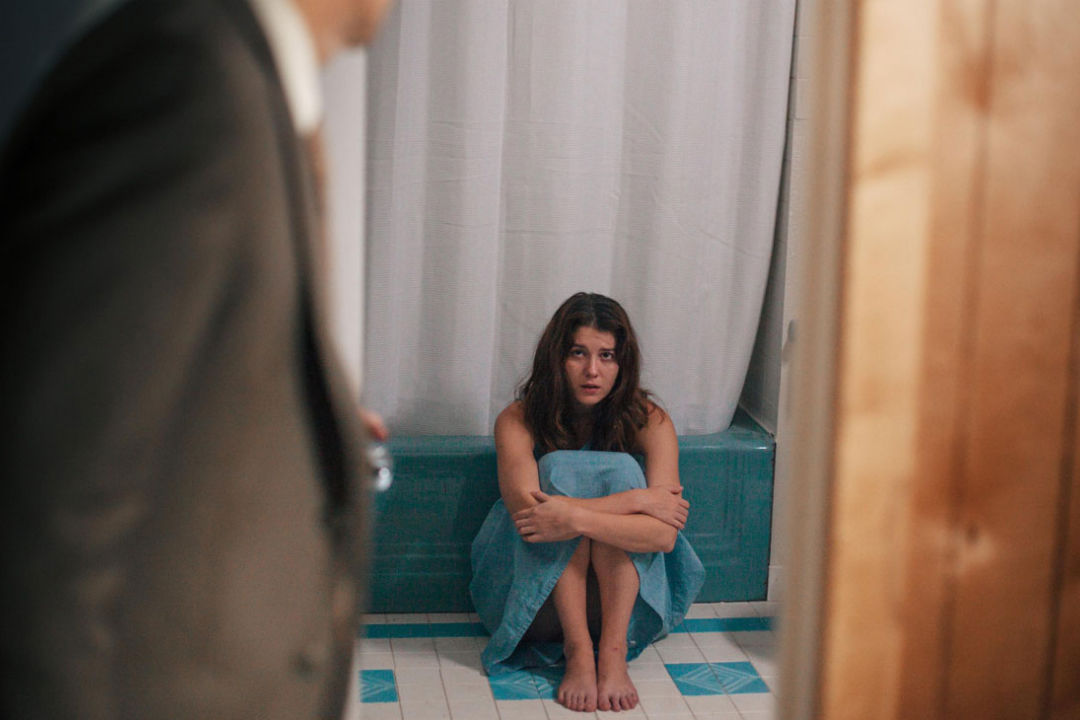
CM: Your cast is filled with great character actors like Orser, Beth Grant, Chris Ellis, Jon Gries, and Lance Reddick. They’re all people we’ve seen pop up in countless films and they always leave a mark, even in small roles. Was that familiarity something you were specifically looking for during casting?
RS: The funny thing for me was that even though they’re all well known actors they’re also all great character actors. The familiarity aspect was part of it for me but more-so in the sense that you know them and feel a sense of comfort when they’re on screen but you also aren’t distracted by them at the same time. They’re all the type of actor who blends seamlessly into the part their playing and the world their inhabiting. And I also knew that because it was my first feature, having their expertise on set would be a huge asset.
CM: The film is produced by Snoot Entertainment, who seem to thrive on a level of frenetic unpredictability in their films (You’re Next, The Guest), which makes Faults a perfect fit for their slate. Did it feel like kismet when they connected with the script?
RS: Keith and Jess at Snoot know exactly what kind of films they want to make. They also know that when something is ready to be made it should be made. They don’t keep futzing with things just for the sake of it. With You’re Next and The Guest, both written by Simon Barrett and directed by Adam Wingard, they’re subverting the the horror expectations. With Faults I always felt like we were subverting the thriller expectations. As I mentioned before they were the first producers to read the script and they ended up being the perfect match for the film. Even though Faults is different from their other films, you’re right that the unpredictable nature of it fit perfectly in with the type of films they make.
CM: Erik Kohn from Indiewire described Faults as, “Martha Marcy May Marlene by way of the Coen Brothers.” What films and filmmakers inspired the tone or style?
RS: I’ve mentioned three films in particular when talking about my movie. Fargo, Dogtooth and Punch-Drunk Love. I’m not big into the whole steal from what you love thing, at least in the way that I work, but I certainly had these three films in the back of my head during the writing and directing process. And then in general The Coen Brothers, Yorgos Lanthimos and Paul Thomas Anderson are some of my favorite directors. The way they all have a command over the tone in their films is something I aspire to.
CM: You’re a semi-frequent contributor to The Talk House, where filmmakers critique current movie releases. Are you ever hesitant to offer film criticism of your peers’ work? Ever worried you’ll run into one of the directors at a party and have to hide in the bathroom? (Or – depending on your personality – get into a fistfight?)
RS: Writing for Talk House has been a great experience so far. It’s really the first time I’ve written about film in my entire life so I’m figuring it out as I go along, but yeah it’s been fun. The idea behind the site is that you’re not really reviewing films, you’re “talking” about them. So there’s no pressure to be negative, or positive for that matter. You usually get to pick the film you want to talk about which also helps make it a positive thing. But if I see something I don’t really respond to, like The Imitation Game for example, I’m not going to lie and say I liked it. I start writing and talk it out and try to be honest to myself. I’d hope other people would do the same for my film. I’m pretty sure Faults is going to be written about on Talk House actually so it’ll be interesting to see what another director thinks!
CM: And on that note, what’s the best piece of constructive criticism you’ve received in your career?
RS: I think the most important thing for me was back when I was writing my first four or so scripts, was that people encouraged me to write in my voice, not copy others. I definitely started out more in a mimicking way of writing and while that’s ok while you’re learning, it was people encouraging me to find my own voice that I’d say made the most difference in my writing and directing.
LIGHTNING ROUND!
What’s the first movie you remember seeing in theaters?
The Little Mermaid
What’s your go-to drink order at a bar?
Beer – A strong IPA
Cocktail – Manhattan
Recommend a movie you love that most people haven’t heard of.
A Matter of Life and Death (aka Stairway to Heaven)
What’s an interview question you never want to hear again?
“What do the nosebleeds in the film represent?”
Finally, where and when can people see Faults?
Faults will be in select theaters and pretty much all the VOD outlets on March 6th!
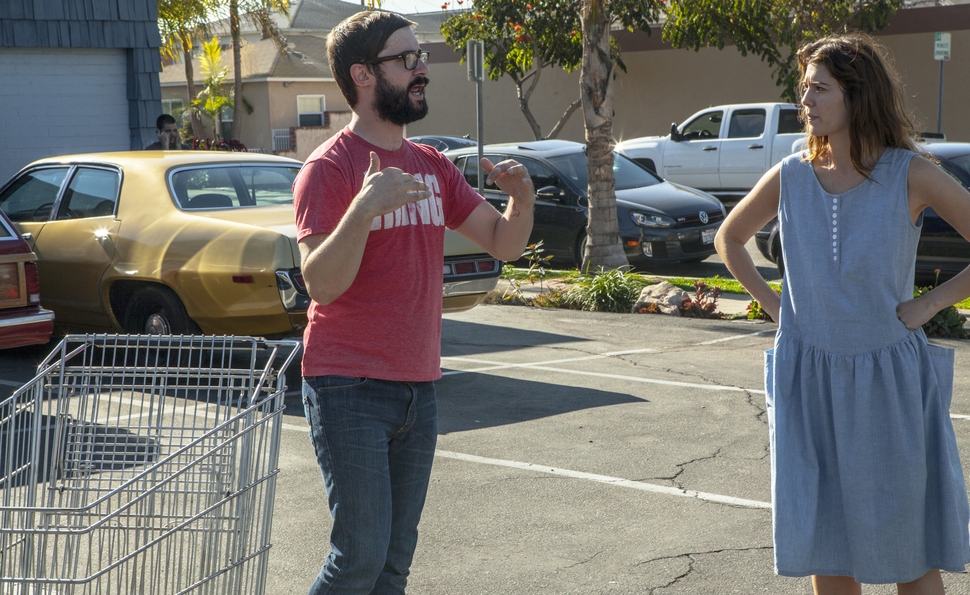
__
Thanks to Riley for talking to us about FAULTS. Follow the film on Facebook or Twitter.
If you’re an independent filmmaker or know of an independent film-related topic we should write about, email blogadmin@sagindie.org for consideration.

